Exclusive interview: Q&A with GreenSeed CEO, David Gray, on the coronavirus and food safety trends


Food Safety Strategies was recently able to talk with David Gray, CEO of packaging provider GreenSeed, on coronavirus concerns, as well as packaging and food safety trends.
Liz Parker: What is the best way to ensure food safety and cleanliness in packaging due to the current coronavirus concerns?
David Gray: We’ve approached the current health concerns under the philosophy of an “everyone culture,” where we come together as a company to develop our staff both personally and professionally. Our people play a crucial role in our daily operations and are skilled at adapting to the ebbs and flows of the food supply chain. The COVID-19 pandemic has made us practice ‘education first’ more stringently than ever before. We are challenging our staff to explore what it means to be clean and what steps are needed to mitigate the spread of infection. Some solutions we have incorporated are limiting our breakroom capacity to 20 employees at a given time, instead of groups larger than 50. We’ve assigned mid-managers to monitor incoming and outgoing staffers, and if anyone shows even a single symptom, we are sending them home with paid time off. We are using gloves at all times. We’re allowing many of our staffers to work from home, unless they are on the manufacturing floor, where we are practicing enhanced safety precautions. We’re currently restricting visitors from other plants and offices, too. We’ve also moved up priorities like swapping out traditional water fountains for water bottle filling stations for a more hygienic work environment. It’s all about practicing vigilant self-awareness in every facet of the workplace.
LP: What kind of sustainable packaging solutions does GreenSeed offer?
DG: GreenSeed is a co-packing manufacturer that operates and advises on customized, packaging solutions for CPG’s in the dry food’s category. Our core competencies are an infrastructure grounded in flexible packaging technology that helps brands right-size their packaging for a lighter, easier delivery to market with longer shelf life. We consult on packaging films that are best suited for our client’s unique needs. Sustainability is at the core of our business and we’ve partnered and worked with non-profit organizations like OSC2 and sustainable film consultants like Rain Child Designs to study and test new packaging materials to advance the commercialization of recyclable and compostable films. In fact, we are sponsoring an exclusive workshop: Redefining Flexible Films, with both of these organizations this Spring to determine and test eco-friendly packaging alternatives. The goal is to help alleviate the massive debris and ocean waste caused by single-use plastic packaging, while looking at way to bring a circular model to society.
LP: How do these packaging solutions help with food safety?
DG: With an emphasis on flexible packaging solutions, we are providing food products with longer shelf life and better overall preservation features than paper-based or rigid, plastic container options. Looking at our current state, the food industry is being tested to produce and ship as much as possible so inventory levels are at a sustainable and working level. To do this requires efficient systems and operations that not only provide our food in better protected environments, but also less stress on the carbon footprint.
Looking for quick answers on food safety topics?
Try Ask FSM, our new smart AI search tool.
Ask FSM →
LP: How did GreenSeed get started? Did you see a need for more environmentally friendly packaging?
DG: We were studying the trends that were happening in Asia/Pacific where the population growth continued to increase in major cities and food supply logistics were stressed as more food was needed in smaller grocery footprints and tighter city locations. Rigid packaging was too difficult to move on the diverse vehicles (bikes, rickshaws, motorcycles, cars, trucks, etc. ...). As a result, flexible packaging solutions began to innovate to support these hurdles. As this technology continued to emerge, we saw an opportunity to build our business model around these shifts and align them towards a segment of the food industry that was growing … natural foods and nutritional products. GreenSeed was born with the goal of being the first contract packaging operations dedicated to this segment where we developed the specific process and systems to support running organic, non-GMO, gluten-free, and kosher products for FMCGs that were committed to scaling these products domestically and internationally.
When you break down the company name, “Green” represents a growth mindset and “Seed” refers to the people, clients and communities that we look to nurture. When we started, we realized that the manufacturing industry needed more of a consultant mindset that could act as a leadership team, providing deep and wide experiences solving the growth demands in contract packaging and contract manufacturing that were creating a challenge for CPG brands globally, which where pivoting from vertically integrated to outsourcing their operations.
LP: In terms of food safety, what packaging trends do you foresee for the rest of 2020?
DG: The origins of the COVID-19 outbreak have spurred greater discussions about the importance of safety and mobility of food products to our global population. Effective flexible packaging solutions, extending to dry proteins and other nutritional food products will be critical as we see the rush to have the right food available at retailers and alternative outlets. Like crises before, we gain findings that stimulate greater innovation. I think we will continue to see more stringent food safety requirements surface from a packaging perspective. While it’s still in its infancy, we foresee more research and testing surrounding sustainable, green packaging alternatives to single-use plastics that will improve our planet’s needs with the goal of having a zero-waste world.









